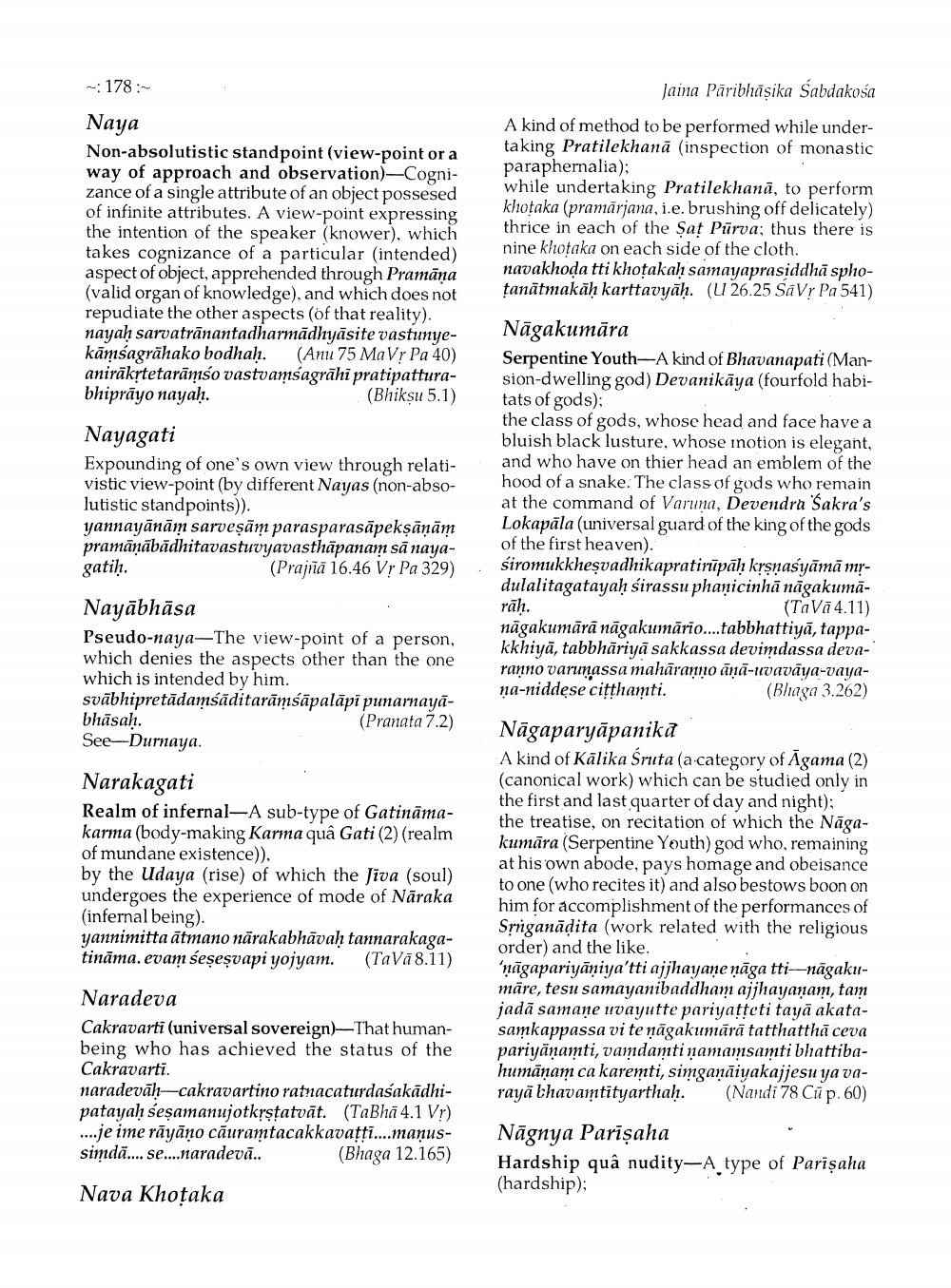________________
- 178:
Naya Non-absolutistic standpoint (view-point or a way of approach and observation)-Cognizance of a single attribute of an object possesed of infinite attributes. A view-point expressing the intention of the speaker (knower), which takes cognizance of a particular (intended) aspect of object, apprehended through Pramāna (valid organ of knowledge), and which does not repudiate the other aspects of that reality). nayaḥ sarvatrānantadharmādhyāsite vastunyekāmsagrāhako bodhah. (Anu 75 Ma Vr Pa 40) anirākṣtetarāmso vastvamsagrāhi pratipatturabhiprāyo nayah.
(Bhiksu 5.1)
Jaina Pāribhāṣika Sabdakosa A kind of method to be performed while undertaking Pratilekhana (inspection of monastic paraphernalia); while undertaking Pratilekhanā, to perform khotaka (pramärjana, i.e. brushing off delicately) thrice in each of the Sat Pūrva; thus there is nine khotaka on each side of the cloth. navakhoda tti khoțakah samayaprasiddhā sphoțanātmakāḥ karttavyāḥ. (U 26.25 SãVr Pa 541)
Nayagati Expounding of one's own view through relativistic view-point (by different Nayas (non-absolutistic standpoints)). yannayānām sarveşām parasparasāpekṣāņām pramāņābādhitavastuvyavasthāpanam sā nayagatiḥ.
(Prajmã 16.46 VỊ Pa 329)
Nāgakumāra Serpentine Youth-A kind of Bhavanapati (Mansion-dwelling god) Devanikāya (fourfold habitats of gods); the class of gods, whose head and face have a bluish black lusture, whose inotion is elegant, and who have on thier head an emblem of the hood of a snake. The class of gods who remain at the command of Varuna, Devendra Sakra's Lokapāla (universal guard of the king of the gods of the first heaven). siromukkheşvadhikapratirūpāh krsnasyāmā mrdulalitagatayaḥ śirassu phanicinhā nāgakumārāh.
(Tavā4.11) nāgakumārā nāgakumārio....tabbhattiyā, tappakkhiyā, tabbhāriyā sakkassa devimdassa devaranno varunassa mahāranno āņā-urvavāya-vayana-niddese citthamti.
(Bhaga 3.262)
.
Nayābhāsa Pseudo-naya-The view-point of a person, which denies the aspects other than the one which is intended by him. sväbhipretādamsāditarāmsāpaläpi punarnayabhāsaḥ.
(Pranata 7.2) See-Durnaya.
Narakagati Realm of infernal-A sub-type of Gatināmakarma (body-making Karma quâ Gati (2) (realm of mundane existence)). by the Udaya (rise) of which the Jiva (soul) undergoes the experience of mode of Nāraka (infernal being). yannimitta ātmano nārakabhāvah tannarakagatināma. evam seşeşvapi yojyam. (Tavā 8.11)
Nāgaparyāpanika A kind of Kālika Sruta (a category of Āgama (2) (canonical work) which can be studied only in the first and last quarter of day and night); the treatise, on recitation of which the Nāgakumāra (Serpentine Youth) god who, remaining at his own abode, pays homage and obeisance to one (who recites it) and also bestows boon on him for accomplishment of the performances of Srnganādita (work related with the religious order) and the like. 'nāgapariyāniya'tti ajjhayane ņāga tti-nägakumāre, tesu samayanibaddham ajjhayanam, tam jadā samane uvayutte pariyatteti tayā akatasamkappassa vi te nāgakumārā tatthattha ceva pariyānamti, vamdamti namamsamti bhattibahumānam ca karemti, simgaņāiyakajjesu ya varayā bhavamtityarthah. (Nandi 78 Cüp.60)
Naradeva Cakravarti (universal sovereign)-That humanbeing who has achieved the status of the Cakravarti. naradevāh-cakravartino ratnacaturdaśakādhipatayah seșamanujotkrstatvāt. (TaBha 4.1 Vr) ....je ime rāyāno căuramtacakkavatti....maņussimdā.... se...naradevā.. (Bhaga 12.165)
Nāgnya Parīşaha Hardship quâ nudity-A_type of Parisaha (hardship);
Nava Khotaka




